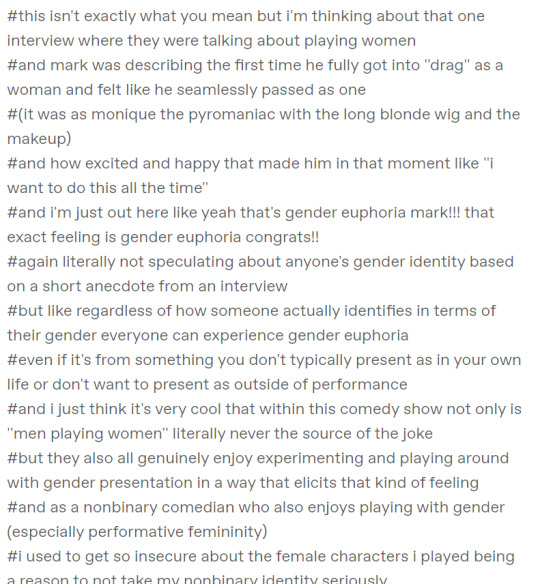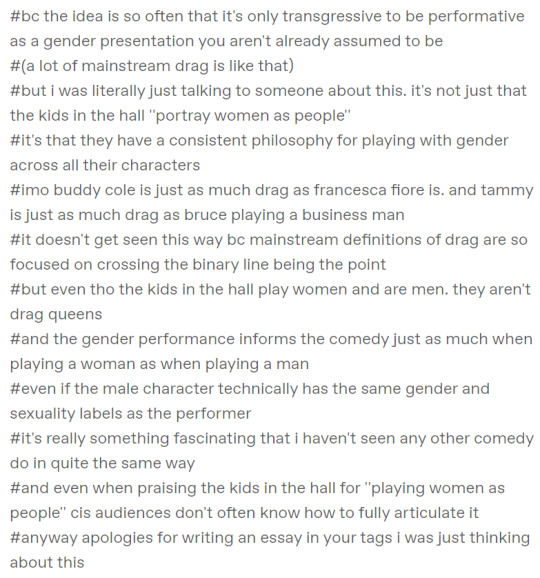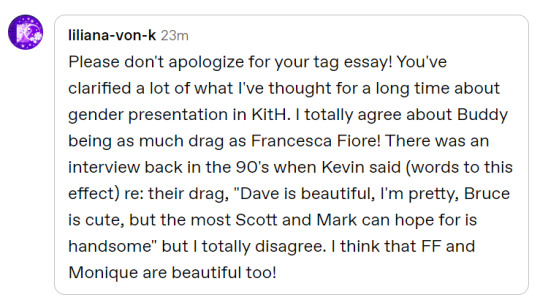#disclaimer the views expressed are my own and not bruce's i'm just saying bruce was part of this conversation and agreed with most points
Text
making my own post bc i have thoughts and i don't want to keep having to go back and forth with tags and replies on someone else's post:
anyway original post i started this conversation on: @charlotterenaissance

my tag essay:


@liliana-von-k's reply:

(all this context is bc i have even more thoughts so i thought i should make my own post)
anyway to respond to that i 100% agree!! it also reminds me of something from my very first conversation with bruce (when we did a zoom interview before we knew each other) which idk if i've posted this aspect of before: i forget what my exact question was but i essentially brought up this kind of paradigm the KITH's female characters are often discussed in and how it's kind of strange comparing it to the actual representation of female characters in the show. like, sure dave "passes" the most as a conventionally-attractive female character, but also i'd honestly say any of the kids in the hall can pass as female, not even just from a genderqueer perspective but from a not all women are "conventionally attractive" perspective. like i know cis women who have a jawline like bruce's or a nose like scott's or any other feature that isn't seen as "feminine" from (often white-eurocentric) beauty standards and many of them are gorgeous.
and the fact that KITH's female characters are often discussed through a lens of "who plays the best woman" (meaning the one who "passes" according to beauty standards) is as frustrating as it is fascinating bc i really do think it points to the way the media tries to comprehend this gender nonconformity and shove it into a box they can understand. because the kids in the hall have already destroyed the most obvious box their female characters could be put in - yes, they are male comedians, but even though the most often way society rationalizes men dressing femininely is as a comedic act (whether as a man purposefully trying to elicit comedy via feminine actions and dress or via a man who genuinely enjoys feminine expression being made an object of ridicule via comedy), the kids in the hall break this framework (this "binary", if you will) by being comedians who are in control of the audience's laughter, but playing their femininity as genuine. you don't laugh with them at their femininity because they do not laugh at femininity, but you also can't make their femininity the subject of ridicule because their position as comedians means they are at once in on the joke and steering the joke in another direction. this technique is more subtextual (and likely subconscious) in the portrayal of female characters, but it's a tactic scott knowingly (and expertly) employs when playing buddy cole
so since the "men in dresses equals comedy" box is eliminated, cishet society feels the need to create another box for them to rationalize this gender nonconformity in, by attributing it to a spectacle other than humor. so they decide to instead view these gender transgressions through the lens of beauty and sexual attractiveness. this also helps rationalize any confusing attraction a cishet person has to one of the kids in the hall dressed as a woman - they pass too well, or at least whichever one you're attracted to (most often dave) does. making a spectacle of the kids in the hall playing women eliminates any confusion or implications that maybe gender and sexuality isn't as rigid as we think, by othering these performers as a special case and convincing yourself that there is no real woman who looks like dave foley in drag, and if there was she would be cis.
it's a slightly better box to be in than having the femininity be the target of ridicule, but it still misses the point that the femininity explored in kids in the hall is not meant to be othered. it leaves out so many of the show's most iconic female characters - fran is not glamorous, but she is a realistic woman. chicken lady is more chicken than lady, but she is still a well-written female character - and reduces others to their attractiveness when the sketch itself is not about that at all. and when i brought this up to bruce he sounded as though he had been waiting for someone to make this analysis, because even though the guys joke about it themselves it is at times uncomfortable to be in an interview that focuses so much on how the interviewer finds dave in drag sexy, or picking apart which physical aspect of the guys passes best. i think i remember bruce saying something to the effect of "no one's asking which one of us is the most hot playing a business man, but that's just as different of a person from us as playing a woman"
and it's interesting to think about this in the context of how the media in general treats people who identify as women in this framework of focusing on physical attractiveness all the time. in recent years, this behavior is more widely known to be sexist af so the overtness has declined (tho is it absolutely still present to some degree), but since the kids in the hall are all male it's fair game to make these sorts of comments about their female characters to their face, because it's spectacle and separate from them. even the exact same people who would call out a comment being made about a cis female comedian are often oblivious of how it could potentially apply to these male comedians, or have other bizarre lines within their ability to rationalize this gender nonconformity for themselves.
take the "wedding dresses" sketch that was censored from the amazon revival for example (this sketch was showcased at sketchfest's "scenes they wouldn't let us do" and has appeared in kith live shows since 2015). this sketch was censored because even though amazon would let the guys play women (and even then it was often an uphill battle), they would not let the wedding dresses sketch air because it featured men wearing wedding dresses in a comedic setting. the rule of thumb seemingly is: men wearing dresses is always comedic (and therefore transphobic), unless he (typically dave foley) passes too well, in which case trans people have nothing to do with the conversation. but the fact that they were men dressed femininely was never the point of the joke, it was the idea of a wedding dress, a significant garment symbolizing an event meant to be only worn for one day, being these guys' everyday wear and all the conflicts and community that came from that. it was an ode to the outsiders, a celebration of those who live and present unconventionally. and the fact that it's never about gender is in itself the most upliftingly genderqueer thing of all.
#time for a jessay#disclaimer the views expressed are my own and not bruce's i'm just saying bruce was part of this conversation and agreed with most points#i did not realize i had all of these opinions but now i'm like damn this might be my favorite jessay i've written#tempted to send it to my professor lmao#also never thought i'd be calling chicken lady a feminist icon but y'know what i am#kids in the hall#scott thompson#mark mckinney#kevin mcdonald#bruce mcculloch#dave foley#david foley#kith#queer#buddy cole
34 notes
·
View notes
Text
saw john doe edit
had thought:
John saying "you broke my heart" to Harley and then possibly —depending on playthrough — hearing the same thing from Bruce is so powerful
Rant
Turned out to be a really long rant/hypothesis/short essay idk lol
Arguably, John realises that whatever he's had going on with Harley was incredibly off-balance — possibly even more than what he has with Bruce, depending on your feelings/playthrough — somewhere during the bridge scene. Maybe a bit before, but right there and then something hits him hard enough to say that to Harley.
John's emotions might seem to be all over the place from our (Bruce's/player's) point of view. However, that doesn't mean John doesn't know how he feels nor does it stop him from expressing his feelings if they're frustrating, confusing, or big enough. Case in point: John points out Bruce's distrust towards him after the Bat places a tracker on him. I assume this expression of disappointment isn't a one time thing, based on John's talk about Bruce's and his off-balanced relationship in the Fun House.
So, during the blockage of the bridge, something ticks John off (pun not intended). The question is: what? Harley's manoeuvres, thinking she has him wrapped around her finger? Bruce's trust, letting him speak with Harley? Memories of their time together? The realisation that they're standing opposite of each other instead of together? All of this and more?
If we assume that you play nice: Bruce still starts off the relationship by using John, but they do befriend each other nonetheless.
Disclaimer: I don't know whether what I'm about to say can take place in the game. Let's look at this hypothetically, like a story, a possibility.
So, you're friends, maybe a bit bumpy but friendly enough for John to face off Harley and tell her she's broken his heart.
What if, the shooting and distrust of the Agency afterwards, is enough for John to take the villain route? I think that especially the possibility of seeing Bruce choose to protect Waller instead of him, who was also at gunpoint, could trigger a 180 in John.
After this whole ordeal John runs off — well, let's himself fall into the water — with a heart in turmoil. I imagine him getting so incredibly frustrated with everything and everyone, including himself, that he just breaks. Like a snake, John sheds an old and useless skin and creates a new one: a strong one, a defensive one, an assertive one — Joker. Additionally, I believe that Joker could either go back to Harley — seeing they're pretty much on the same side again— like canonically in the game, or leave her due to resentment.
Let's say what comes next, would be pretty much the same as Telltale invisioned it; the games, hurting and threatening the city all happen, and at last, the rooftop scene.
Bruce, beaten up, shaken up by all he's learned of his friends, and honestly, above all, tired, runs after Joker — who he still sees as John.
Extra subject to rant about at a different moment: Bruce insisting Joker is the same John he knows, or at least, that he can get through Joker to John, is really sad.
Once he catches up with John, Bruce decides to yell: "You've broken my heart, John!" — the very same words John spoke to Harley, said by the person that was supposed to be her opposite. Being on the receiving end of something you said to someone that hurt you, must sting, a lot.
So Joker lashes out, to protect, but also to stop himself — John — from resurfacing and suffering.
Because it is unfair! It is unfair to hear that he's on the wrong side! For him to end up where people he wants to loath (note: assuming the Harley thing hit hard) are, opposite Bruce Batman ('Bruce' has too much emotional value, so Joker depersonalises him), must be a cruel joke!
And so — through pain caused, as well as experienced, lack of guidance through the ambiguities of life, and yearning for control over life's unjust jokes — John becomes a repressed memory and Joker evolves into Gotham's own bred, born and raised...villain or victim?
You deserve a cookie for reading all of that. Here, have some: ✨🍪🍪🍪✨
I guess I really needed to let all of that out, huh. After all, I haven't really rambled about this to anyone because I really don't want to be judged for making their relationship this intense and even possibly, slightly romantic in a complicated way.
This is tumblr though, so I can hide behind my silly nickname and just throw things that are on my mind into the void of the internet.
(it's 1 AM)
#telltale batman#telltale john doe#telltale bruce wayne#telltale batjokes#ngl#lowkey#telltale juce#i love stories being grey and morally complicated like that#yay#telltale joker#vigilante joker#too many hashtags#an i love you would have sufficed#i know nothing about dc pls
108 notes
·
View notes